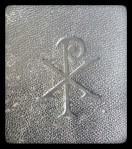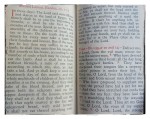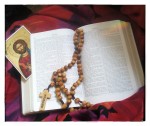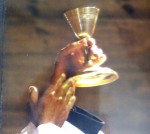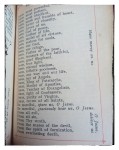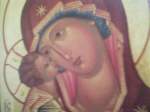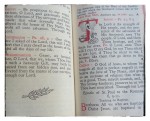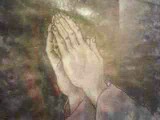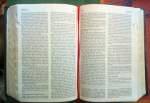
“IN THE CATHOLIC CHURCH, AND IN THE CATHOLIC CHURCH ONLY, THE ENDLESS INTRICACIES AND PHENOMENA RECORDED IN THE GOSPELS ARE REPRODUCED ON THE STAGE OF HUMAN HISTORY”
“…let it be observed that in Catholic Christianity alone is such a claim even made as that which has been described. It may be said, without the possibility of contradiction, that in not one of the great world-religions, in not one of the smallest and most arrogant sects, has the proclamation ever been made that the Founder lives in a mystical but absolutely real life in a Body composed of His followers. There have been mystical phrases used occasionally, in certain forms of Buddhism, for example, faintly suggestive of this presence of a Master with His disciples in a very intimate and transcendent manner; but never has it been asserted, in Buddhism, Mohammedanism, Confucianism, in any form of Protestantism, in any other creed, that the great bulk of the faithful compose a living organism whose dominating personality is Divine. Never, except in Catholic Christianity, has the assertion been solemnly made and deliberately acted upon – ‘I am the Vine – you are the branches’; ‘He that heareth you, heareth Me.’
THE FAITHFUL COMPOSE ONE SINGLE UNIFIED LIVING ORGANISM
It is sufficiently remarkable that the Catholic claim is an unique one. ‘I have read,’ says St Augustine, ‘all the sages of the world; and not one of them dares to say ‘Come unto Me.”I have looked, the Catholic may say today, upon all the Churches of the world, all the world-religions, and all the sects, and not one of them dares to take upon her lips the words of very Deity. Many say, ‘I possess the truth, I teach the way, and I promise the life’; but not one, ‘I am the Way, the Truth, and the Life.’ None, except one, and that is the Catholic Church, claims to be actually Divine and to utter the Voice of God. The Anglicans dare not excommunicate for heresy; the Nonconformists do not wish to… There is but one body in the world, and that is the Catholic Church, which behaves, moves, and speaks as only a Society conscious of Divinity can behave, move, and speak.
THE CHURCH IS CONSCIOUS OF HER DIVINITY
But the significance of the uniqueness of this claim is multiplied an hundredfold if in any way it can be justified. If it can but be shown that the claim is a Catholic commonplace, that all the Church’s actions are based upon that supposition, that the success of her policy depends upon it, that the unique phenomena of her life spring from it, that, in fact, the very heart of her life is the very assertion itself; if, finally, that assertion made by her, and made by Jesus Christ in the Gospels, produces the same results, and those results impossible of production on any other hypothesis, then, so far as moral proof can go, the claim is vindicated.
If, in short, Jesus Christ has succeeded in producing such a Society as this, giving her a confidence that is more than human, and a success unparalleled in human history – if He is able to present to the doubter such a Body as this in which He lives, able to extend hands and side to the touch of scepticism, in proof that it is indeed Himself, risen again and again from what is more final even than death to all merely human energies, then it is hardly possible to imagine any other response but that which Thomas made – ‘My Lord and my God.’
“COME UNTO ME”
For the appeal of the Church is in its essence an extraordinarily simple and direct one. Certainly it is possible to state that appeal in elaborate and intricate terms, to describe, justify, and indicate by illustrations, metaphors, and the rest, until the case seems too utterly complicated to be true.
AS SIMPLE AS “MOTHER AND CHILD”
Yet the appeal itself is as simple as that of a mother to a child. I believe there are very learned books written on the motherly and filial instincts; it is possible to describe a smile in terms of muscles and sinews, and to analyse tears into lime and hydrogen and other elements; yet for all that, smiles and tears are the simplest things we know. And the appeal of this intricate Society, claiming to possess as she does the wisdom of the Eternal and the Source of all love, is for all that as direct and as simple as the glance of a woman’s eyes into the eyes of her child. All the eloquence of her orators and the learning of her divines, and the elaborateness of her worship, may be summed up in that single sentence that can only adequately be pronounced by the lips of Divinity – ‘Come unto Me.’
THE EUCHARIST
I treat of the Church from an aspect familiar to Catholics, and yet one that, it would seem, is almost entirely unknown to non-Catholics. One can find, in book after book, the most admirable treatises upon the Church as a human Society, as a worshipping Society, as a patroness and inspirer of art, as a form of pious Freemasonery, as a police force to keep the poor quiet, as a refuge for the ineffective, as the home of learning. Yet non-Catholics, as a rule, seem simply unaware that there is another point of view, infinitely more significant… from which that Society is regarded as the Body in which the Divine Being tabernacles among men; and that, in spite of the fact, that without this aspect, without at any rate the fact of this belief existing, the main phenomena of that Society’s history are inexplicable.
This is as wildly unscientific as to think that you have accounted for a Cathedral, if you leave out the worshippers’ belief in God. It is no explanation of the Cathedral to discourse about the Bishops, and the word ‘Cathedra’ as signifying his seat. A more fundamental point is, Why should there such a phenomenon as a Bishop at all? Polyphonic music may be characteristic of a Cathedral; but why should anyone take the trouble to sing? The architecture may be excellently Gothic; but why is there such a thing as architecture?
“THE CHURCH COMPOSED OF ALL AS ONE UNIT IN THE HIERARCHY ORDAINED FROM TIME IMMEMORIAL BY GOD IS THE TEMPLE OF GOD, THE HUMAN BODY IN WHOM THE SON OF GOD TODAY DWELLS AND SPEAKS”
Such commentators as these, on the subject of the Catholic Church, state, blandly, that she is the best organised Society upon earth; the most elaborate and august in her worship; the Mother of the noblest art; the most exclusive Society in one sense, and the most inclusive in another. Or, again, they denounce her as the masterpiece of Satan, or the monument of the keenest human ambitions; or the unhappy result of an elaborate series of social conditions; or as a fetish whose sanctity rests upon nothing but superstition or association or circumstance; and they seem even to be unaware that countless minds as shrewd as their own have, after an examination of the evidence all round, deliberately come to the conclusion that she is actually the Temple of God, actually the social, corporate, and human Body in whom the Son of God today dwells and speaks, and it is for this reason, beneath all the others, that she is what she is.
I am not complaining of their affirmations; I have no quarrel whatever with the lights they have thrown upon her history – even upon the less reputable parts of that history – her sins of ommission or commission, considered as a result of her extremely human humanity – I only protest against their ignorance of the fact that there is another point of view – their tacit assumption that phenomena which do not fall under their categories are not phenomena, and that any account given of her must be unreal and negligible, for the reason that it is in other terms than their own.
THE ONE AND UNIQUE ORGAN OF DIVINE REVELATION
This, then, is my object in these pages, to speak of the Church on the hypothesis that she is the Body of Christ in very truth, that what she, as an organism, and not merely as a conglomeration of fallible and faulty units, does, says and lives, is the action, speech, and life of Jesus Christ. I am able to show a strong presumption that this is so – that the Life recorded in the Gospels is reproduced with inimitable fidelity in the life of the Church, and that the characteristics of that life are the characteristics of a Divine Life, I shall also have established a presumption that she is indeed what she claims to be – the one and unique organ of Divine Revelation. It is necessary therefore to keep this point of view in mind, at least as an hypothesis, throughout. Alexander VI may have been a very wicked man; that does not affect the argument. Catholics may, very often, be very stupid and unspiritual; that does not affect the argument. Transsubstantiation may be a very difficult doctrine; it may appear to some that the worship of Mary, as they understand it, is degrading, or the practice of confession humiliating; there may be excellent explanations for the miracles of Lourdes, or the ecstasies of St Teresa, or the predominance of the City of Rome – all this does not affect the argument in the very least.
It is necessary to remember that all these things may seem facts, and yet the Church may be the Body of Christ, and He its Soul and its Supreme Life. Sins of omission and commission on the part of Catholics, stupidities, misunderstandings, apostasies, ignoble and unfashionable circumstances, countless failures, tragedies, comedies and even screaming farces – these simply do not touch the matter at all. Our Lord was betrayed by one Apostle, repudiated by another, and forsaken by the rest; He was the fool of Pilate’s court, the butt and buffoon of Herod’s. Even when He lived on the earth in the Flesh, “His visae was more marred than any man’s, and His countenance more than the sons’ of men.’”
– By Msgr Robert Hugh Benson. [Headings in capital letters added afterwards.] This is an excerpt from Msgr Benson’s book “Christ in the Church”, B. Herder, 17 South Broadway, St Louis, MO, USA, 1913.
